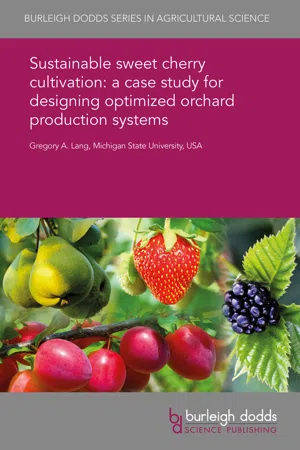
Sustainable sweet cherry cultivation: a case study for designing optimized orchard production systems
- English
- PDF
- Available on iOS & Android
Sustainable sweet cherry cultivation: a case study for designing optimized orchard production systems
About this book
Sweet cherries are an inherently challenging crop to produce sustainably, subject to crop loss from climatic events, birds, insects, and diseases, and requiring extensive manual labor due to large tree canopies and small delicate fruits. Nevertheless, cherry production has increased dramatically worldwide for the past two decades, driven by strong consumer demand and innovations in (a) plant materials (self-compatible cultivars and precocious, vigor-limiting rootstocks); (b) efficient orchard training systems; (c) orchard microclimate modification technologies, and (d) physiological knowledge for successful adoption of these tools. This chapter examines sustainable sweet cherry cultivation, starting with opportunities and challenges in this field of research, then follows coverage of cherry morphology, growth, and fruiting. Cultivars and rootstocks for sustainable production are discussed, as are tools for optimizing orchard tree development. The author then explores rationales and innovations for designing optimized orchard production systems. The evolution of very narrow, planar (two-dimensional) canopy architectures that utilize multiple leaders per tree (in proportion to the composite vigor of the rootstock, cultivar, climate, and soil) is proposed as being increasingly important for labor-efficient, partially-mechanized, crop load-optimized production of sweet cherries, as well as that of other tree fruits as well. The chapter concludes with a section on mitigating abiotic and biotic risks to sustainable production.
Frequently asked questions
- Essential is ideal for learners and professionals who enjoy exploring a wide range of subjects. Access the Essential Library with 800,000+ trusted titles and best-sellers across business, personal growth, and the humanities. Includes unlimited reading time and Standard Read Aloud voice.
- Complete: Perfect for advanced learners and researchers needing full, unrestricted access. Unlock 1.4M+ books across hundreds of subjects, including academic and specialized titles. The Complete Plan also includes advanced features like Premium Read Aloud and Research Assistant.
Please note we cannot support devices running on iOS 13 and Android 7 or earlier. Learn more about using the app.
Information
Table of contents
- 1 Introduction – opportunities and challenges
- 2 Morphology, growth, and fruiting
- 3 Plant materials for sustainable production
- 4 Tools for optimizing orchard tree development
- 5 Designing optimized orchard production systems
- 6 Mitigating abiotic and biotic risks to sustainable production
- 7 Conclusions and future trends
- 8 Where to look for further information
- 9 References